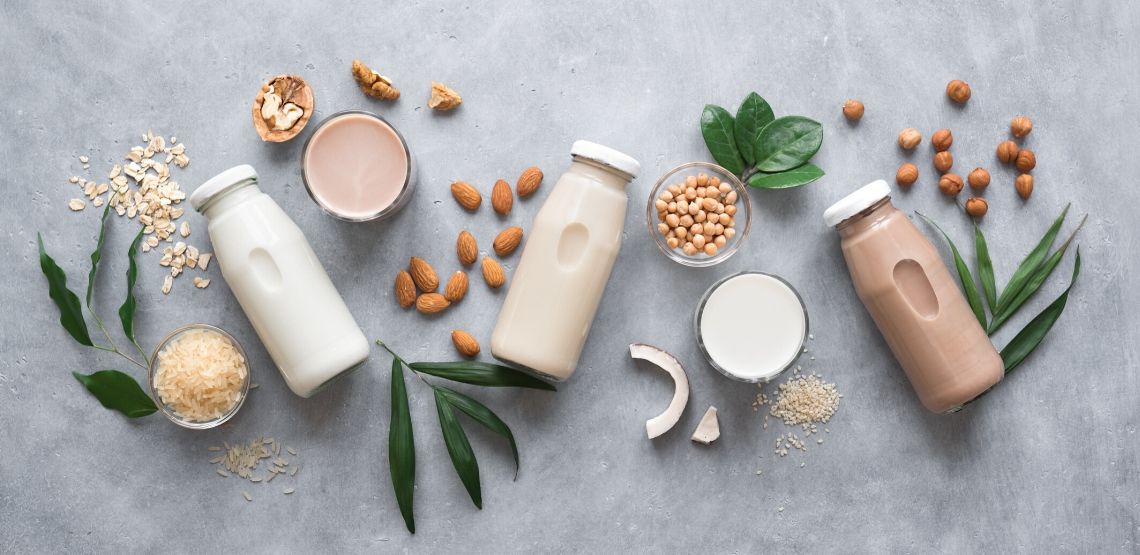A World of Dairy Substitutes
Many consumers choose to give up dairy due to sensitivity, lactose intolerance, adhering to a vegan lifestyle, or a simple taste preference.
While milk was once a staple in every fridge, dairy is increasingly giving way to milk substitutes which are becoming more readily available in any grocery store. As demand grows, you can also pick up plant-based milk alternatives for everything from ice cream, cheese, yogurts and anything typically made from dairy. There many options for dairy substitutes.
Reasons for Choosing Dairy Substitutes
There are many reasons to consider using a milk substitute. Millions of people experience some type of dairy sensitivity or intolerance. Even if you have never been officially diagnosed, you still might experience digestive discomfort after consuming dairy and you might feel better without it in your diet.
Some people who pass up dairy are vegans (those who do not consume any animal products). These people usually choose dairy substitutes for ethical, environmental, or health reasons.
Even if you do not identify as vegan, many people choose dairy substitutes because of the decreased environmental footprint plant-based milks have, compared to traditional dairy production, which demands more environmental resources. Animal cruelty issues also raise another reason for choosing dairy substitutes, as inhuman practices in dairy farms have caused concern among consumers and animal welfare advocates.
Dairy-Free Milk Options
An array of dairy-free milk choices line grocery store shelves and are easy to find. They are also affordable and provide delicious, nutrient rich options for cooking, adding to cereals or as a drink. These choices include:
- Soy milk. One of the first dairy-free milk options to hit shelves, soy milk is a good basic plant milk for any use and is high in protein and low in carbs.
- Pea milk. Packed with protein, it is an ideal choice for those avoiding soy. This plant-based milk is made from peas and has a creamy consistency.
- Oat milk. Many find oat milk to be a close substitute in taste and consistency to traditional cow’s milk. It is lower in protein but high in healthy fiber and carbohydrates.
- Almond milk. This is an affordable option that is easy to find. Almond milk is very inexpensive and often fortified with vitamins and calcium.
- Coconut milk. For creamier taste and consistency, coconut milk is a great option for cooking, cereal, or creamer.
As more people choose dairy alternatives, more milk substitutes are popping up on shelves, such as hemp, pecan and macadamia nuts. Most mainstream coffee shops and restaurants offer non-dairy milk and as demand grows, prices of dairy alternatives continue to come down.
Other Dairy-Free Foods
It is easy to find dairy-free versions of foods like cheese, yogurts, whipped cream, sour cream, puddings and ice creams. Those who give up milk no longer have to miss out on their favorite foods because it is easy to find dairy-free foods that taste similar or identical to the real thing.
What About Calcium?
A long-held belief is in order to have strong bones, calcium from cow’s milk is a necessary staple in any diet. Studies have shown the exact opposite and suggest that not only is dairy not the only way to get ample calcium, but higher consumption of dairy can actually be associated with higher rates of osteoporosis and other illnesses. Avoiding or limiting dairy is actually better for your bones and overall health, and you can get ample protein from leafy green veggies, tofu and dairy-free, fortified milks (just check the labels).
Read Your Labels When Choosing Dairy-Free Substitutes
Keeping a close eye on food labels is important no matter what you are purchasing and consuming. Before choosing dairy substitutes, read the labels to ensure you are making a healthy choice. For example, those with soy intolerance might react negatively to soy milk or ice cream and none of us should be eating foods that contain tons of added sugars, artificial flavors, color, or other ingredients you do not recognize.
Pros and Cons of Choosing Dairy-Free Foods
As long as you are choosing options that are made with healthy ingredients, there are essentially no drawbacks to choosing dairy-free alternatives. Traditional dairy provides calcium and vitamins such as vitamin D, however all those nutrients can be found in other sources, so that is not a reason to consume dairy. Make sure you are getting plenty of calcium and vitamin D from foods like leafy greens, nuts and seeds, tofu, and fortified foods, or taking a supplement if you find it hard to meet the RDA.
Dairy is hard or impossible to digest for a whopping 75% of the world’s population. It can be highly irritating for stomach and bowel issues, allergies and sinuses, and is loaded with culprits like saturated fat and potentially added sugars, plus antibiotics and growth hormones that can be disruptive to human health.
If you feel better removing dairy from your diet, there is no reason to continue eating milk and plenty of perks for choosing these dairy substitutes.
